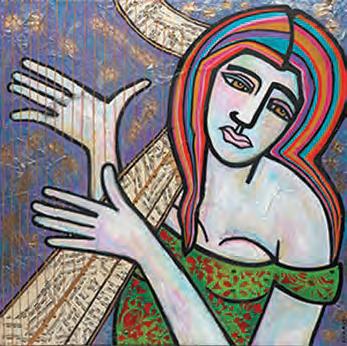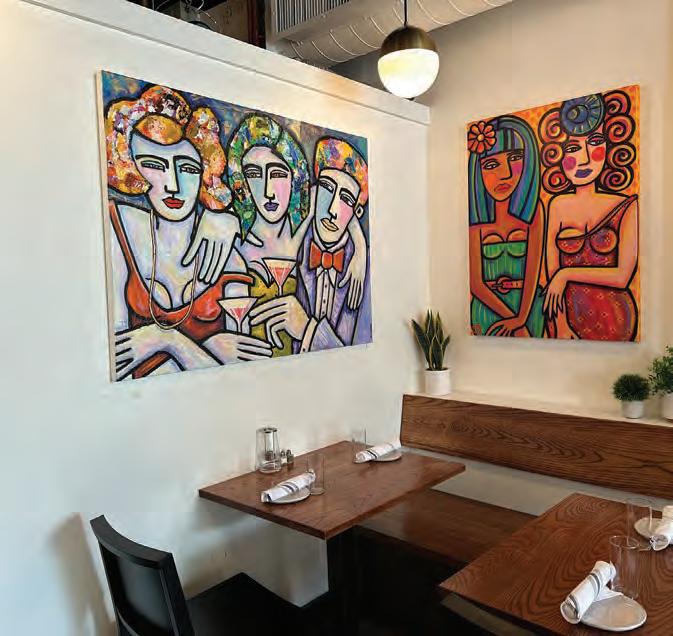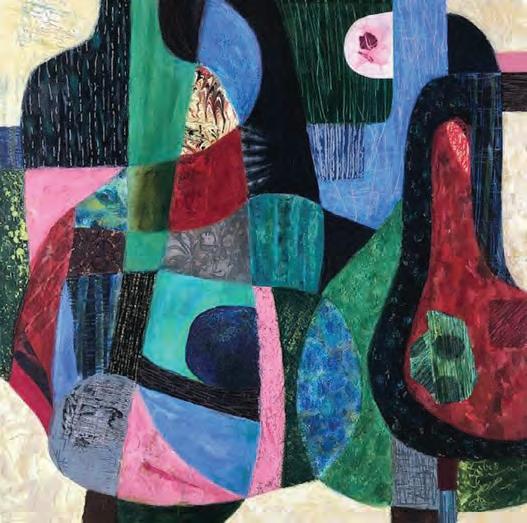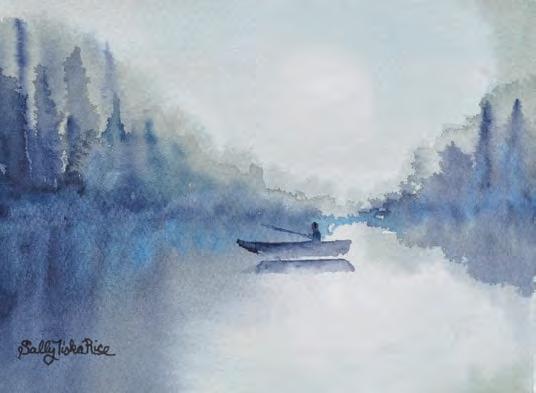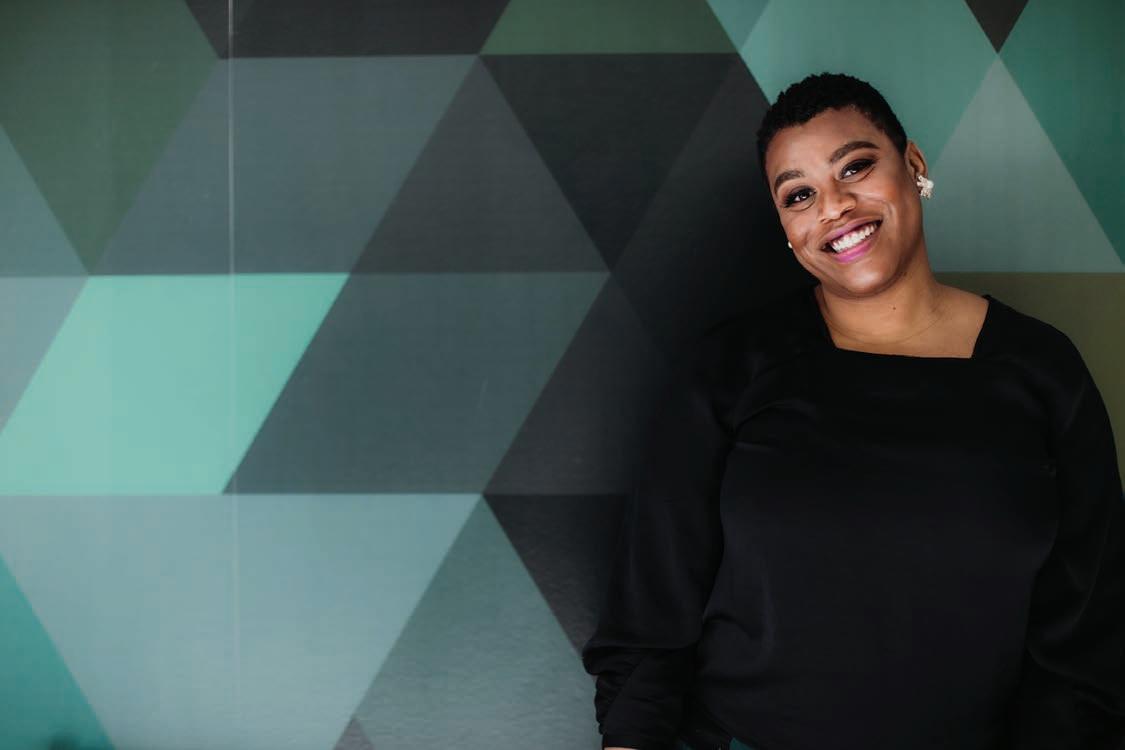
9 minute read
WHITNEY MORRISON Soprano
Interview by Harryet Candee
Soprano Whitney Morrison, who was recently named the inaugural Artist-in-Residence at the Lyric Opera of Chicago, will make her Berkshire Opera Festival debut as Mimì in Puccini’s La Bohème, August 26, 29, and September 1 at the Colonial Theatre in Pittsfield. She has earned praise for her “big, gleaming soprano” (Chicago Classical Review) and “vocally sumptuous” performances (Chicago Tribune). A Chicago native and recent alumna of the Ryan Opera Center, Whitney champions the African American aesthetic in classical music, embracing a style of performance that blends classical singing technique with elements of the gospel singing tradition. We’re so glad she spent some time with us, to tell us about her artful mind.
Advertisement
Harryet Candee: Complexity and human experience for you mean what in terms of your work as a performer?
Whitney Morrison: The whole thing. I see myself as a kind of minister of experience. My gifts lie in the humanities and the arts and so I am consistently mining my own experiences for real truth that can be translated on the stage. That happens all the time in each moment.
How far do your influences span?
WM: My influences span my ability to perceive and consume. My influences are not really limited in any way. I find inspiration in literature and my own lived experiences. For example, I am now reading Cole Arthur Riley, an author who puts words together almost like embroidery: delicate, impactful, functional. She self-identifies as an introvert, so she is a perfect person whose brain
I can pick for Mimi. Reading her book This Here Flesh, and seeing things from her perspective has served as a kind of reconnaissance for Mimi.
You initially did not plan on opera being your venue, but you were drawn into it? What was your connection with The Ryan Opera Center for Young Artist Programs?
WM: My entry into the opera field was through singing, unattached to operatic repertoire. Classical singing technique can be used in different kinds of expression like song or musical theater. My choir teacher, Lana Manson, was instrumental in this process (if anyone can say they discovered me, it would be her). She found me singing first alto in concert choir and said “if you show up, I will teach you voice lessons.” So, I showed up, I showed up every day. She gave me lessons and a whole artist’s palate to choose from. It was there that I learned I had a skill and capacity for classical voice.
By the time I was into the Ryan Opera Center, I had already been pursuing opera for several years. A position in a prestigious young artist program had been on my vision board. After seeing artists like J’nai Bridges and Will Liverman emerge from Ryan Opera Center in Chicago, which also happened to be where I was from, I knew I wanted one of the coveted spots there. It was a privilege I know that a lot of young people don’t get.
What is your connection with Gospel Music?
WM: Gospel music forms my roots. I didn’t have a traditional upbringing because my parents split when I was younger. I went to different churches as a visitor, so I got an interesting curriculum. I was introduced to a lot of church traditions that shaped my view on the style, and that has given me interesting roots to pull from because I wasn’t planted in one place for a long time as a child. I actually mostly sang in school coming up. I sang with gospel choir in high school, but after a while I did have church performances as well.
It wasn’t until college that I was singing in any one church very regularly, but by then I was primarily a classical singer so there was a lot of mixing and blending of genres at that point.
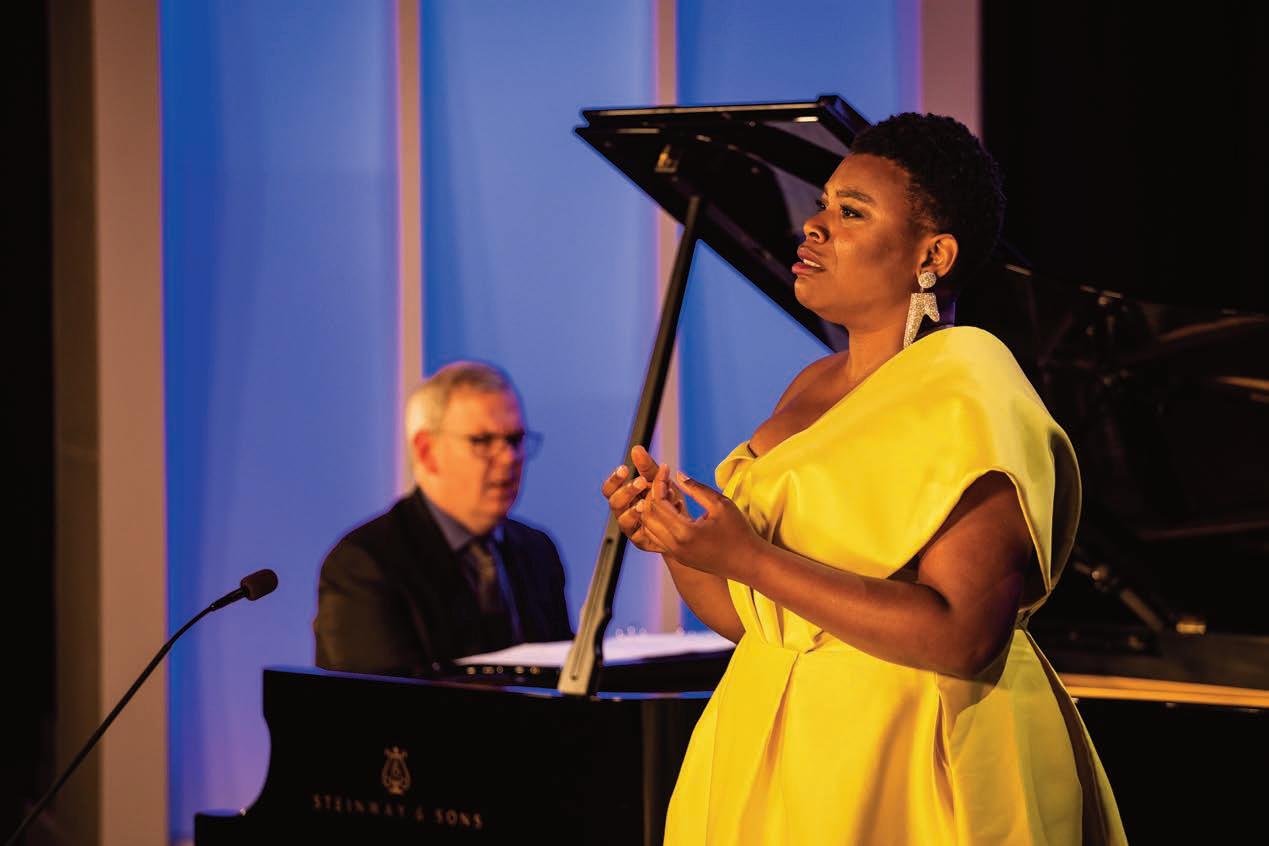
What did you enjoy the most about studying other subjects alongside music at the Eastman School at the University of Rochester, NY?
WM: There was an extra-curricular path where we could take classes like music business that were not a part of our degree requirement. I think some of the practical skills and the opportunity to think more creatively and entrepreneurially were great seeds for my residency with the Ryan Opera Center at Lyric Opera of Chicago.
One project I am working on for them now –which I can’t share just yet – was initially a project I did for that class and for which I won an entrepreneurship contest.
Tell us about a day in your life and thoughts related, Whitney.
WM: Though it is easy for some people to com- partmentalize their life from their artistry, that is not really my approach. Mine is much more integrated. My own personal growth and care are vital to my art practice. The base of that includes the way I eat, hydrate, sleep and entertain myself, as well as different things I do for growth like reading and other experiments and moments. I take my music along with me throughout the day. At school, I would make flashcards and if I was standing in line at the cafeteria, I would pull them out a rehearse a measure. It is a kind of practice without walls.
I do traditional practice where I sit and study a score and sing through passages and study the language as people would expect. But I think the way the most compelling and integrated way to practice is by really engaging with the work.
My eighth great literature teacher Ms. Cokely gave me one of the best pieces of advice for engaging with a piece of art when we were reading the Diary of Anne Frank. I wasn’t sure how I was supposed to identify with Anne Frank as a girl growing up in the southern suburbs of Chicago.
She taught us that whenever you are reading something, write in the margins whatever comes to mind, whatever it makes you think of, whatever doesn’t make sense, anything that is unrelated but your brain goes there. This allowed me to take things from a different culture and context and be able to bring myself to it in a way that is authentic to me, but that is also authentic to the style and place of the work itself. It provides a way to connect. I am always thinking through the music in this way. I think about not just words, but the impulse behind them, if it feels natural. Would I say that, would someone say that? This is not just happening at my desk or at my piano - though those times are important - it can be at a stoplight on 67th Street as I drive through Chicago. I carry the music that I learn with me in my spirit whether I am at my desk or not.
Explain the Ryan Opera Center and your instructors and teachers that inspired and fed your ambitions and goals as a singer.
WM: Winnie Nyhus, my elementary school music teacher introduced us to Mozart’s Alleluia as part of an exploration of so many different types of music, all of which she taught us from a culturally neutral place. No one kind of music seemed more important than anything else, from Native American music to pop music. We could explore without putting too much on it. This fostered my exploratory spirit, even now. Even if music is in a different language, we don’t really say different things. Continued on next page...
Julie Moore-Foster from Oakwood University where I did my undergraduate studies continues to be a friend and mentor. She shaped the progression of my pedagogical development and has been a great supporter.
Today I study with Julia Faulkner of the Lyric Opera of Chicago’s Ryan Opera Center. I booked a lesson with her online about seven years ago. When I showed up, she thankfully remembered me from a previous audition. She must have liked what she heard, because she let me stay and study with her. Since then, she’s been one of my biggest, most generous supporters, helping guide my singing technique and path forward. She prepared me for that audition at Ryan Opera Center and helped me forge a relationship with the house.
What is it with opera that you might find challenging as an artist?
WM: I think in general, there is a challenge in going into a primarily white space and system, with a curriculum that teaches people things that are not true about people with my hue. I am always trying to maintain my health while managing relationships with people who do not have a similar background to me, and may have ideas about who I am before I open my mouth. My mistakes seem to count for a lot more and my wins are seen as representative of more than me as well. That is a burden my white colleagues may not carry.
Whitney, what, in your opinion, from experience, would you say is the most spiritual, mysterious, and deeply rooted connection opera has had for you up to the present?
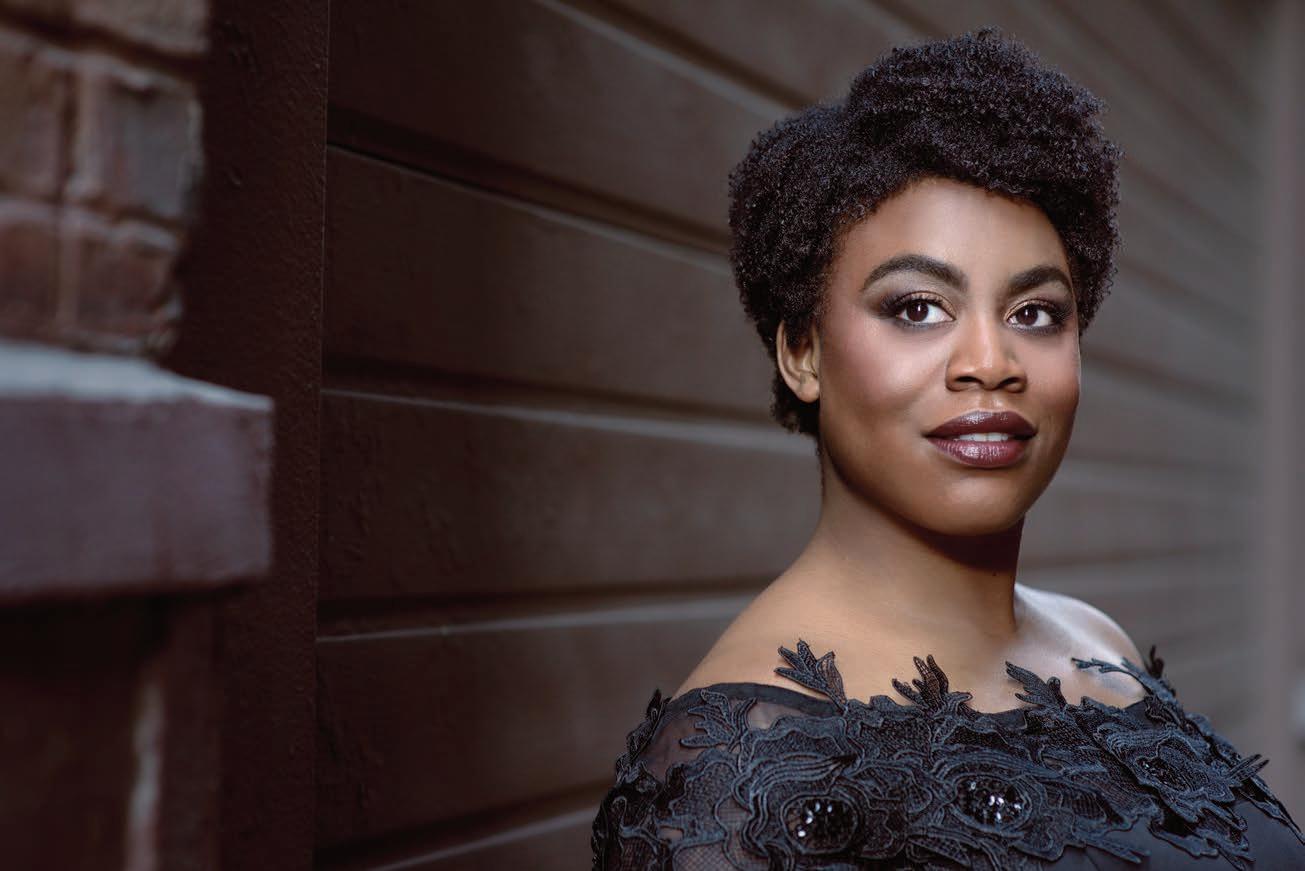
WM: Anything you sing that has a story and that has a real depth of intention. For me, that synergy of communicating something true through the mysterious and spiritual offerings of my personal energy through the integration of body/mind/spirit is what falls in that category. The integration of all parts of me, through music. But I have a similar experience while writing or with any art form.
Have you also composed music?
WM: I have ideas for music and melodies and have done a little arranging. I haven’t yet penned a complete composition, but it is not off the table.
The Berkshire Opera Festival is excited to have you on board for La Boheme this season. Is this your first time performing with BOF and visiting the Berkshires?
WM: I have never been to the Berkshires and this is my first Mimi, so it is both a role and company debut.
What is the most rewarding and beneficial lesson you have learned so far that can be shared, especially with those vibrant, emerging music students everywhere?
WM: What you need for excellence is within you and anything that points primarily to someone else or somewhere else is a red herring. Be focused on your own development and unique offerings and abilities. This foundation allows your thumbprint to be on everything you do, which is the point.
You are the Lyric Opera of Chicago’s first artistin-residence. Tell us what that will entail and about your Growing Room performance art installation.
WM: This residency is a unique and important opportunity to develop my own creative projects. I have had many ideas for work that I didn’t know would have a space to exist. It is nice for the space to be made with Lyric Unlimited for this experimental crucible. I can take ideas that predated this residency and have the chance to produce and experiment with them in ways that expands the breadth and depth of opera and classical music mediums. Our first project was Growing Room. For this mobile, pop-up performance art installation, we turned a greenhouse into a practice room, filled it with plants, a piano, a mirror and an artist. For this installation, I practiced as I would anytime, at various spots on the streets of Chicago.
Part of the performance art nature of Growing Room was not engaging with the passersby, it was one of the most incredible experiences with focus that I’ve been afforded the opportunity to have. From the outside, I was told it allowed people to interact with the work and classical music in a different way. There was no social script about how to interact with the thing, though. It was a big draw for people watchers who might come, sit on blankets and watch people slowly approach and have an experience. After a while I forgot cars were passing on the busy street. I just got into the zone. As an artist isn’t it paramount to focus on what you are focusing on rather than focusing on people focusing on you?! You have to prioritize what needs your attention and what doesn’t.
This project is a kind of advocacy because people love a finished product but have a hard time appreciating the process by which the finished product comes to them.
Growing Room is a metaphor for artists’ need for protection and provision in challenging seasons in order to develop to maturity, parallel to how a greenhouse allows plants to survive, grow, and produce through all seasons.
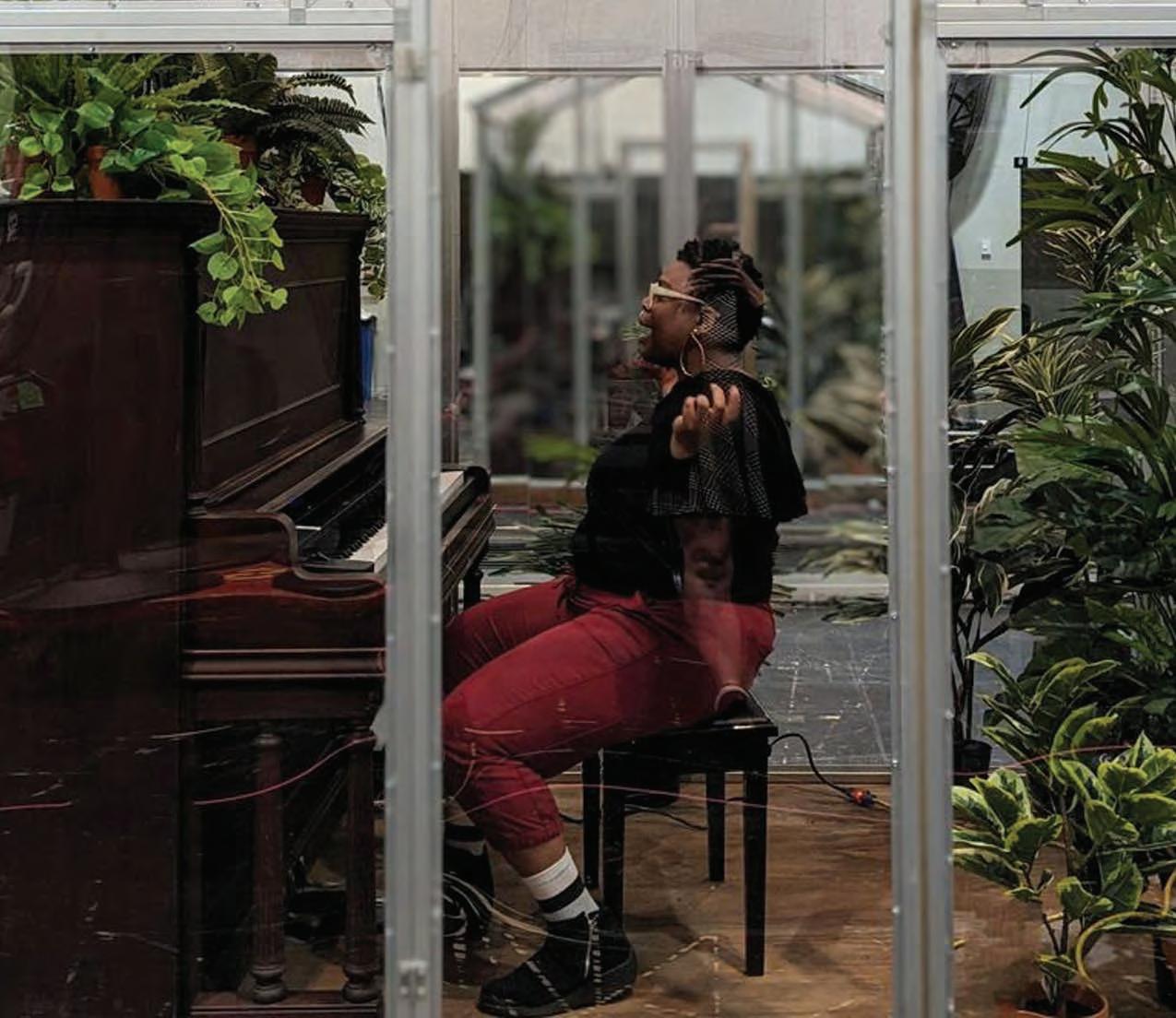
Through Growing Room, there are resources, places, and spaces especially for developing young artists—the most vulnerable. This project also honors the hidden, humble, and vital practice work of all artists.
Practice is a key component of every artform, yet the hours, discipline, and focus required are seldom understood and appreciated by arts patrons and audiences.
Thank you, Whitney!
Puccini’s La Boheme: Saturday, Aug 26, 1pm; Tuesday, August 29, 7:30pm; Friday, September 1, 7:30pm at The Colonial Theatre, Pittsfield, MA info@berkshireoperafestival.org
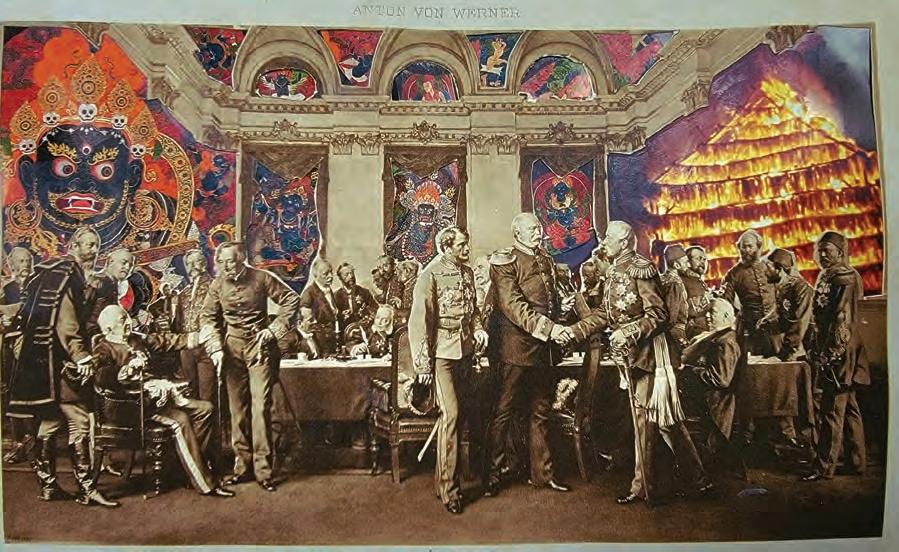
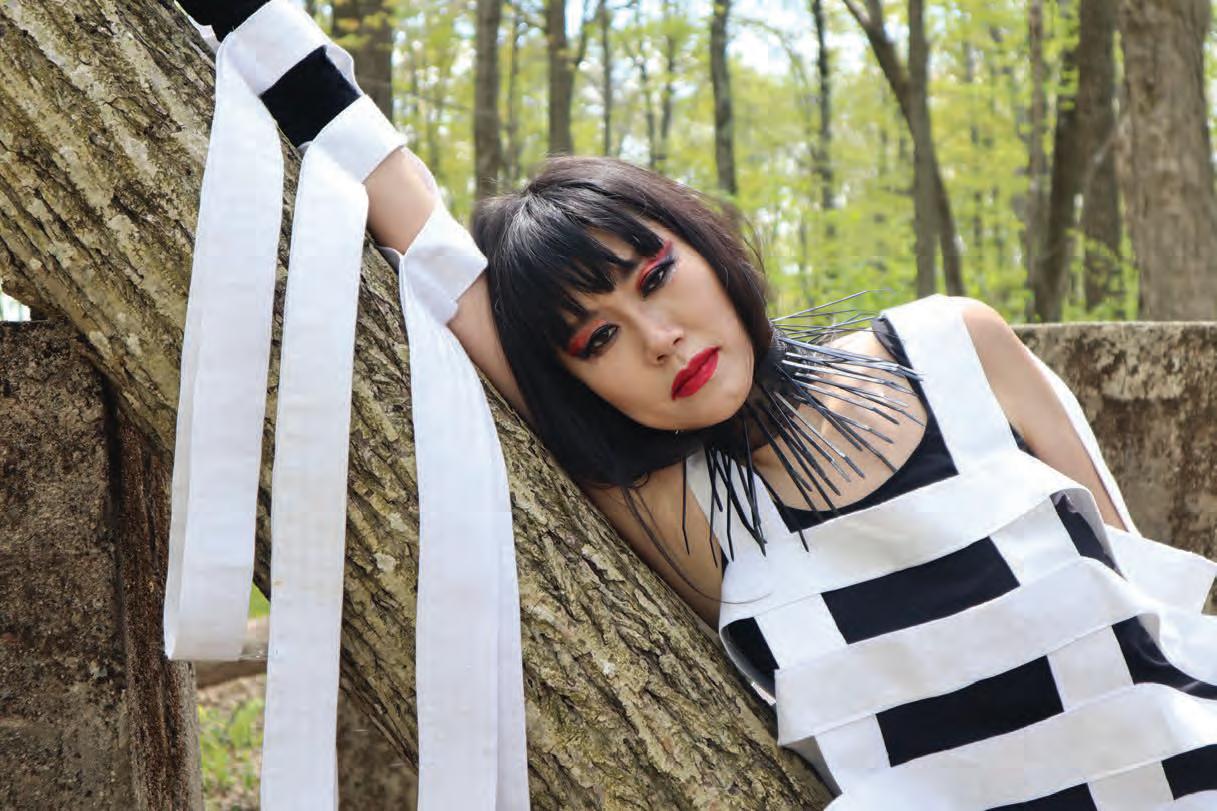
Marion H. Grant
Sally Tiska Rice
